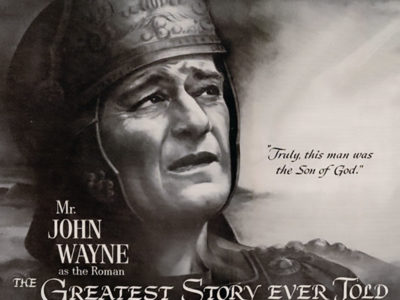DID THE SOLDIER AT THE CROSS really say Jesus was the divine Son of God?
I remember watching actor John Wayne in a cameo performance for “The Greatest Story Ever Told,” the 1965 film about the life of Jesus. Mr. Wayne, known as the Duke, played the part of a Roman centurion in charge of the crucifixion detail.
He delivered this line:
“Truly, this man was the Son of God.”
There’s a legend, which sounds like it might be true, that in rehearsal the Duke delivered the line a bit too flatly for the director. So the director said, “Not like that. Say it with awe.”
The Duke delivered the line again:
“Aw, truly this man was the son of God.”
3 different Gospels, 2 different quotes
In paraphrasing the Bible for the Casual English Bible, it’s hard to miss the fact that the different Gospel writers telling the stories of Jesus report many details differently.
I’m working right now in the Gospel of Mark, which most Bible experts seem to believe was the first of the four Gospels preserved in writing. Matthew, Luke, and John all seemed to come later.
Matthew and Luke seem to pull a lot of their material from Mark. Or perhaps Mark from one of them, if Matthew or Luke came first. Somebody is apparently copying off the other. Not that this is cheating or illegit. Someone seems to be using someone else’s work as reference material, much like I use commentaries to help write books about the Bible.
Here’s how the Gospel writers quoted the centurion in charge of the crucifixion. Instead of using my paraphrase, the Casual English Bible, I’ll let you see a more literal version. It’s from the Bible translation that many scholars prefer, the New American Standard Version.
“Truly this man was the Son of God!” (Matthew 17:54).
“Truly this man was the Son of God!” (Mark 15:39).
“Certainly this man was innocent” (Luke 23:47; a footnote says “innocent” could also mean “righteous”).
The Gospel of John doesn’t mention the soldier.
That’s odd, if the soldier really said Jesus was the Son of God and if this Gospel was written by John, who many Bible experts say was the only disciple with the courage to stand at the Cross beside Mary the mother of Jesus.
Here’s why it would be odd. The Gospel of John is the one best known for trying to prove that Jesus is the divine Son of God. John made that clear enough in his mission statement:
“Jesus did many other miracles… These are written so that you may believe that Jesus is the Christ, the Son of God” (John 20:30-31 NCV).
Something about the way Jesus died impressed the centurion.
Maybe it was the combination effect of the sky turning black, the ground shaking in an earthquake, and Jesus forgiving his executioners who beat him, nailed him to across, taunted him, and then gambled for his clothing.
Maybe the centurion really did think that Jesus was the divine Son of God, as Christians today do.
Or maybe his theology wasn’t that developed. Maybe when he spoke about the “Son of God” he meant the “son of God.” Not the divine son of God. But a child of God—a righteous soul who served God.
I don’t think that’s how most Christians would understand the soldier. But from what I can tell, a lot of Bible experts read it that way.
If the centurion thought of Jesus as divine, it’s also possible he was thinking of Jesus in the same way many Romans said they thought about Caesar. They called him a god and they described him in writing as the “son of God.”
Whatever the centurion thought of Jesus, the soldier was impressed.
If he thought of Jesus as anything less than the divine Son of God, maybe we shouldn’t think of that as diminishing Jesus or the Bible.
Instead, maybe we should recognize that the soldier had little contact with Jesus and limited insight into who he was.
Regardless of what the soldier thought, we know what we think.
We say it out loud.
And we say it with awe.


The Duke was the quintessential Movie Star. He excelled at just playing his iconic self, but really wasn’t the man to trust to deliver a key line in a historical drama.
Though, in fairness, the whole movie was kind of more Hollywood epic (complete with all star cast) than deeply spiritual drama.
Yes, that movie featured a galaxy of stars.
Speaking of movies Stephen have you had a chance to see “I Can Only Imagine”?
Hi Mike. No, I haven’t seen the movie.
I do see that it is getting good reviews. It’s getting a 70% on rottentomatoes.com. And I see that 94% of the people who said they saw it said they liked it.
That’s not bad for a faith-based movie. Christians have been struggling to make engaging and entertaining movies. They tend to like to work a sermon in there somewhere.
When they figure out that you can get your message across without preaching a sermon, they will be making a big leap forward in connecting with people outside the faith.
It’s worth seeing. Not preachy but inspiring.
Bring some kleenex..
Will do. Thanks Mike.
Maybe the Roman solder was Jewish and knew full well what Jesus was suppose to be. Just maybe but I say that with no evidence what so ever.
Hi George. That sounds like a fair guess. Romans often recruited soldiers from the local region they were occupying.
I don’t know if any of the Roman soldiers in what is now Israel were Jews. But I have read that many were from the Middle East. A lot were recruited from what is now Syria, which provided the main base for the Roman army.
It’s worth seeing. Not preachy but inspiring.
Bring some kleenex..